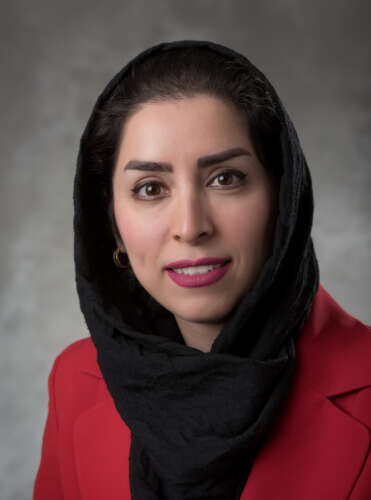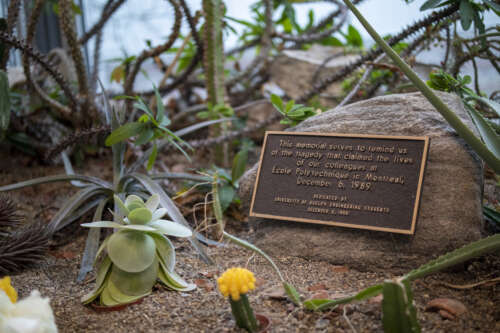
University of Guelph engineering professor Hadis Karimipour is fulfilling her potential as a national leader in the cybersecurity of critical infrastructure. But she knows that not all women have been able to reach their own potential, and she’s working to change that.
When Karimipour reflects on the 14 young women killed in the École Polytechnique massacre in Montreal on Dec. 6, 1989, she is deeply saddened by the great loss of potential careers and worldwide contributions.
“They had so much potential and could have done so much,” said Karimipour. She now encourages young women to consider careers in science, technology, engineering and math (STEM) and to use their intelligence and creativity to their fullest.
Each year, the National Day of Remembrance and Action on Violence Against Women remembers the lives lost to a misogynistic act of violence. Thirteen of those young women were engineering students. U of G’s School of Engineering will hold an online video tribute on Friday at 11 a.m.
Karimipour is grateful that she can pursue research crucial to the well-being of society. She studies ways to reduce vulnerabilities in critical infrastructure that is essential to health, safety, security and economic well-being.
“My focus is mainly on critical infrastructure because the performance of society and the everyday life of the society depends on it. Things like smart power grids, oil and gas refineries, and smart transportation underlie every country’s social and economic activity.”
Integrated with the internet and communication networks, today’s complex critical infrastructure is highly vulnerable to various cyber and physical security threats, she said.
“Cyber-attacks in critical infrastructure can compromise physical security, cause production downtimes, damage equipment and result in financial and reputational losses.”
Karimipour aims to develop intelligent, AI-enabled security and monitoring solutions to maintain the secure and reliable operation of these systems.
She said few women work in this area. To help address that imbalance, she sought to gain her own experience and expertise and to encourage other women to enter the field.
“There is a high demand for researchers who specialize in security issues, especially around critical infrastructure, and the perspective of women is much-needed.”

As director of the Smart Cyber-physical System (SCPS) Lab at U of G, Karimipour is a pioneer in the use of machine learning for security analysis of critical infrastructure. She is widely published and has been the keynote speaker at numerous conferences around the world.
In recent decades, the numbers of women enrolled in post-secondary engineering programs and working in the profession have risen. But men still vastly outnumber women in the field, and she wants to help close the gap.
“When I joined engineering, I always had this feeling of being the only woman in the room. There weren’t many of us in the classroom or on the faculty. It always bothered me that there was this gap, because whether you can succeed in something or not should be based on your intelligence, not your gender.”
She encourages young women to consider engineering careers at conferences and social events for organizations like the Institute of Electrical and Electronics Engineers (IEEE), Women in Engineering, Women in STEM and Women in CyberSecurity. She chairs the IEEE Women in Engineering Kitchener-Waterloo section.
“If they are strong in math and physics, then engineering and cybersecurity would probably be something interesting for them, where they could make a big difference.”
In school, Karimipour was gifted in math and physics. Her father, a lawyer, challenged her intellect and creativity by asking her complex questions and giving her difficult problems to solve.
“I was always asking him how things worked, and he was excellent in challenging me, by asking more questions to find the answer myself,” she said. “He really pushed me to think out of the box, and that helped me succeed.”
She said STEM professions need more women to bring diversity through different perspectives and creativity that help solve problems in new ways.
When Karimipour learned of the Montreal Massacre, her first question was to ask why someone would think engineering was a profession reserved for men.
She began learning all she could about the young women and imagining what they might have become. “Their potential was taken from them,” she said. “It is so sad.”
Based on the theme of “remember, reflect, respond,” U of G’s commemoration of the National Day of Remembrance and Action on Violence Against Women will feature a video tribute with guest speakers. The women’s names will be read aloud and flowers will be placed at a memorial in the Thornbrough Building.